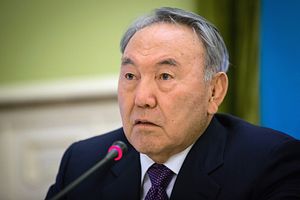Central Asia may be one of the least economically integrated regions extant, but the countries remain as tapped into Western legal structures as any – especially when attempting to smother opposition voices. The latest bit of legal manipulation came last year, when the Kazakhstani government used the Computer Fraud and Abuse Act (CFAA), a U.S. federal statute, to sue unnamed “Doe” defendants in federal court in New York.
The suit followed a series of damaging email and document leaks – nearly 70 gigabytes’ worth – that came to light a year ago. Instead of targeting the leakers directly, however, the Kazakhstani government sought to use the CFAA to block opposition media that would report on the leaked documents. Namely, they’ve gone after Respublika, one of Kazakhstan’s longest-tenured opposition voices, and one of the few to survive the government’s demolition of non-state media.
However, Respublika will not have to fight on its own. The San Francisco-based Electronic Frontier Foundation (EFF), one of America’s foremost digital freedom advocates, has taken up Respublika’s cause, both promoting the situation publicly and supporting the outlet legally. Earlier this week, EFF filed a motion for clarification with the presiding judge, ticking through all the manners in which the removal of Respublika’s content contravenes American law.
“There is no indication that Kazakhstan has attempted – successfully or otherwise – to secure the takedown of articles by other news outlets concerning the [leaked] documents,” the motion reads, pointing to the Kazakhstani government’s decision to target Respublika specifically. Not only would removing the reportage undermine the outlet’s First Amendment rights, but Astana “has not demonstrated that ceasing publication of the information exposing corruption and inside-dealing will advance a governmental interest of the highest magnitude.”
Indeed, exposing prior corruption has found Respublika – one of President Nursultan Nazarbayev’s regime’s “fiercest critics” – within the government’s crosshairs almost from the outlet’s inception in 2000. EFF has ably detailed Respublika’s struggles. After the newspaper disclosed Nazarbayev’s decision to stash $1 billion in state oil revenues in Swiss bank accounts, Respublika found dog carcasses strewn outside both its office and founder Irina Petrushova’s apartment. As one attached note read, “There will be no next time.” Soon thereafter, government pressure eliminated any printers willing to carry the newspaper, forcing the staff to “[piece] together a limited distribution using home printers and staples.” The pressure eventually saw the elimination of a print run in 2014, meaning Respublika remains online only. Even then, however, reaching readership remains difficult. Not only does the outlet suffer continual distributed denial-of-service (DDoS) attacks, but according to EFF, “In order to access Respublika’s news from within Kazakhstan, readers must either find ways around the blocks or access the content through social media sites.”
Now, the Kazakhstani government is seeking to use the U.S. court system to eliminate Respublika altogether – even attempting to use the legal system “to pry personal information about Respublika employees and volunteers.” EFF, however, has decided not to stand idly by, and has elected to represent Respublika in court. As EFF pointed out following the initial injunction, “Kazakhstan [is] willfully abusing the court’s order.” The legal outcome remains to be seen, but EFF has helped clarify that the Kazakhstani government is targeting Respublika specifically. As EFF notes, Kazakhstan “has not even conducted the discovery that it hopes might prove that Respublika was somehow connected to the purported theft.”

































